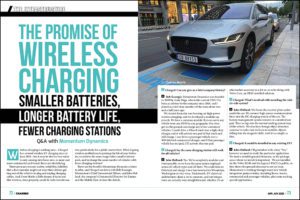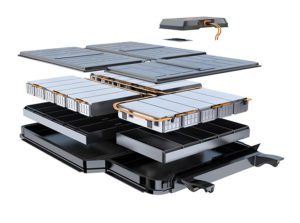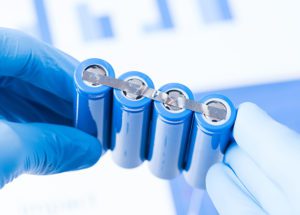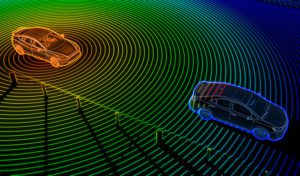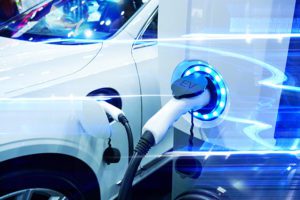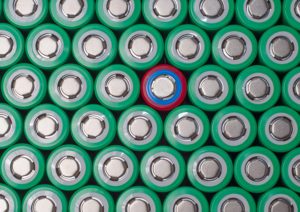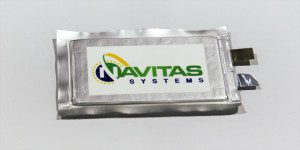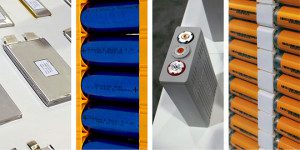Q&A with Momentum Dynamics Wireless charging is nothing new—Charged has covered wireless EV charging since at least 2011—but it may be that its true value is only coming into focus now, as more and more commercial and transit fleets are electrifying. There are many reasons (safety, reliability, liability) that a fleet operator might not want… Read more »
Search Results Found For: "second life"
How to improve heat dissipation and EV battery lifetime
Sponsored by Von Roll Next-Generation Adhesive Products for Battery Applications How to improve heat dissipation, productivity and lifetime performance of battery modules and packs As the current trend is moving away from conventional ICE (Combustion Engine) power train systems to fully or hybrid electric systems, there is a strong demand and need for next-generation materials… Read more »
Silicon anode nanostructure could increase battery capacity and lifespan
Image caption: In the first stage, the silicon film exists as a rigid but wobbly columnar structure. In the second stage, the columns touch at the top, forming a vaulted structure, which is strong due to arch action. In the third stage, further deposition of silicon atoms results in a sponge-like structure. The red dashed… Read more »
Researchers claim their graphene “SuperBattery” achieves a 15-second charging time
Skeleton Technologies and the Karlsruhe Institute of Technology (KIT) say they have developed a graphene-based battery with a 15-second charging time, as well as charging cycles counted in the hundreds of thousands. The so-called SuperBattery’s key component is Skeleton’s patented Curved Graphene carbon material, which enables the high power and long lifetime of ultracapacitors to… Read more »
Evaluating the effects of automation on range and battery life
A team of researchers at Carnegie Mellon University (CMU) used a vehicle dynamics model to evaluate the effects of automated driving on EV range and battery longevity. They compared autonomous vehicles (SAE levels 4 and 5) with human-driven EVs by calculating the additional energy required to power the automated driving components, as well as the… Read more »
Silica-based cathodes could enable long-life lithium-sulfur batteries
Scientists from the Daegu Gyeongbuk Institute of Science and Technology (DGIST) have developed a silica-based cathode for lithium-sulfur batteries, which they say could enable batteries that last for over 2,000 charge/discharge cycles. Lithium-sulfur batteries (LSBs)—composed of a sulfur-based cathode and lithium anode submerged in a liquid electrolyte—are promising candidates to replace lithium-ion batteries because of… Read more »
LiTDI: An electrolyte additive for extended battery life and fast charging
Sponsored by Arkema With the electric vehicle market driving a surge in demand for lithium-ion batteries, research is intensifying to develop new electrolytes that not only ensure battery performance, lifetime, and safety, but also enable high-energy anode materials, such as silicon, and cathode materials, such as NMC 811. High purity electrolyte components are crucial to… Read more »
AI algorithm accurately predicts the life cycle of Li-ion batteries
Scientists at MIT, Stanford and the Toyota Research Institute (TRI) have developed an AI algorithm that they say can accurately predict the useful life of Li-ion batteries. The algorithm analyzed factors such as voltage decline to make predictions as to how many more cycles a battery would last. The predictions turned out to be within… Read more »
Navitas to develop second-gen Li-ion batteries for military vehicles
Navitas Systems, a provider of energy storage products and power electronics, has won a $7.2 million contract to develop next-generation lithium-ion batteries for military vehicles. As new power-hungry electronics proliferate, the US Army’s Tank Automotive Research, Development, and Engineering Center (TARDEC) has been working with Navitas to develop prototype 24 V lithium-ion batteries in the… Read more »
DOE study: Battery second use offsets EV expenses, improves grid stability
A recent analysis from the DOE’s National Renewable Energy Laboratory (NREL) has confirmed the value of something that several automakers are already investigating: repurposing used EV batteries for stationary storage applications. The NREL found that battery second use (B2U) strategies are capable of offsetting the costs of recycling vehicles at the end of their lives,… Read more »




